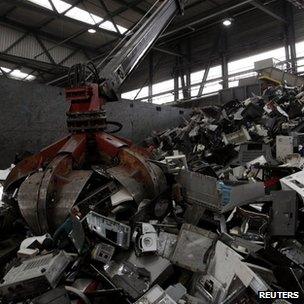When recycling is the second-best option
- Published
LJ Rich visits a Restart party in Camden, London
On a warm summer's night they came, bearing the damaged and broken, to the place where old things are healed and made whole again.
This time they came to the Camden Town Shed, in north London, but next time it could be a church hall, market stall or community centre near you.
Ugo Vallauri and Janet Gunter are the co-founders of The Restart Project, which aims to stop people throwing away broken gadgets and other electrical items and, instead, get them fixed by taking them along to a Restart party.
At these gatherings, damaged and broken devices and gadgets are taken apart, and hopefully repaired, by the teams of fixers that the project brings together.
Bamboozling jargon
The idea came out of work Mr Vallauri has done with Computer Aid, a charity that refurbishes old computers for use in developing nations.
"They fix almost everything in those places," he said, "they just don't have the money to buy them new."
By contrast, he said, in developed nations people have lost the will to fix broken gadgets. A combination of convenience and cultural pressure leads people to buy new rather than repair.
"Also people have lost trust in commercial repairs. They do not know who to go to and who they can trust, especially when it comes to electronics and electrical goods."
Just as when people take their car to a mechanic, people often fear that when they take their broken gadgets to a repair shop they will be overcharged or bamboozled by jargon.
The idea with Restart is to overcome that fear by getting people involved with the repair process themselves.
Opening up a kettle, coffee grinder or laptop and helping to take it to pieces is a powerful way to get over that fear, said Ben Skidmore, one of Restart's roster of regular fixers.
That fear tends to evaporate completely if the item in question gets fixed, he said.
The fixers at Restart parties include people like Mr Skidmore who have been tinkering as a hobby for years, to others such as Francis Dove who runs an electrical repair shop.
When someone walks in to a Restart party with a damaged or broken gadget, it goes through a "triage stage" during which its owner describes the symptoms and people offer their opinions about what's wrong.
Then, more often than not, it is put on a tabletop, taken to pieces and the repair work begins.
"The best technicians are nosy," said Mr Dove, peering at the exposed circuit board of an LCD TV.
Boombox beats again
On average about 20-25 people bring along something in need of repair to a Restart party, said Mr Vallauri.

About a quarter of electrical and electronic waste will work again
In Camden, the fixers got to grips with, amongst other things, an LCD TV, a boombox, a digital car radio, a laptop, two digital cameras and a pair of headphones.
On the night some, such as the boombox, were easy to fix. The boombox's radio tuner looked broken, but when the case was cracked open it emerged that the piece of plastic that moves when the tuning wheel is turned had simply slipped out of sight.
In moments, it was returned to its track and the repair was done.
Others were trickier. Mr Dove instantly spotted dodgy capacitors on the circuit board of the LCD TV that were responsible for putting it into an eternal standby mode. Ripping them out and replacing them should solve the problem, he said.
For Mr Vallauri, the failing capacitors are symptomatic of the way modern electrical equipment is built. Manufacturers could choose to use components that cost a fraction more and radically lengthen the life of the average gadget, he said.
Instead, he said, more often than not they go cheap and produce goods that have obsolescence built in.
Fixing items that suffer this manufacturing neglect is straightforward even though few people know it. Mr Vallauri quoted research which suggests that about 23% of the waste electrical equipment in recycling centres could be refurbished and repaired easily.
Unlocking the value in that could prove a huge boost to local economies in financial and social terms, he said.
Unfortunately, he said, that value is hard to realise because most recycling policies involve local authorities signing a deal with a contractor to manage the waste.
That divorces people from being involved with what they discard, said Mr Vallauri. The undoubted convenience comes at a high social cost.
Getting between the authority and the waste management firm is hard, he said, but would reap real dividends.
"We don't like it when we see things that end up in a skip, or even recycled by our councils, when they could have a second or third life if only we use some basic repair skills," he said.
- Published11 April 2013
- Published20 March 2013
- Published14 March 2013
- Published19 July 2012
- Published20 March 2013